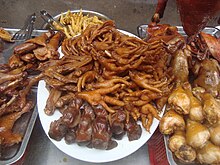Chicken feet

Chicken feet and other chicken parts for sale on a roadside cart in Haikou, Hainan, China.
|
|
| Alternative names | feng zhao, ji jiao, ji zhao, Ceker |
|---|---|
| Place of origin | China, Korea, Indonesia, Thailand, Laos, Vietnam, Malaysia, Singapore, Philippines, Trinidad and Tobago, Jamaica, Russia, Ukraine, Romania, Moldova, South Africa, West Africa, Central Africa, Peru, Mexico, Italy |
| Main ingredients | Chicken feet |
| 0.073 kcal (0 kJ) | |
| |
|
| Chicken feet | |||||||||||
| Traditional Chinese | 鳳爪 | ||||||||||
|---|---|---|---|---|---|---|---|---|---|---|---|
| Simplified Chinese | 凤爪 | ||||||||||
| Hanyu Pinyin | fèngzhǎo | ||||||||||
| Literal meaning |
Fenghuang claws or Phoenix talons (claws) |
||||||||||
|
|||||||||||
| Transcriptions | |
|---|---|
| Standard Mandarin | |
| Hanyu Pinyin | fèngzhǎo |
| Yue: Cantonese | |
| Jyutping | fung6 zaau2 |
Chicken feet are a part of the chicken that is cooked in China, Indonesia, Korea, Thailand, Laos, Malaysia, Trinidad and Tobago, Ukraine, Russia, Romania, Moldova, Italy, Jamaica, South Africa, Peru, Mexico, Philippines, Cambodia and Vietnam. After an outer layer of thin skin is removed, most of the edible tissue on the feet consists of skin and tendons, with no muscle. This gives the feet a distinct texture different from the rest of the chicken's meat. Being mostly skin, chicken feet are very gelatinous.
Chicken feet are used in several regional Chinese cuisines; they can be served as a beer snack, cold dish, soup or main dish. They are interchangeably called Fèng zhuǎ (鳯爪, phoenix claws), Jī zhuǎ (鷄爪, chicken claws), and Jī jiǎo (雞脚, chicken feet).
In Guangdong and Hong Kong, they are typically deep fried and steamed first to make them puffy before being stewed and simmered in a sauce flavoured with black fermented beans, bean paste, and sugar; or in abalone sauce.
...
Wikipedia
